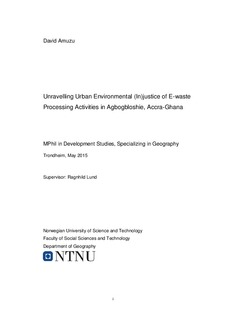Unravelling urban environmental (in)justice of E-waste processing activities in Agbogbloshie, Accra-Ghana
Master thesis
Permanent lenke
http://hdl.handle.net/11250/2372980Utgivelsesdato
2015Metadata
Vis full innførselSamlinger
- Institutt for geografi [1108]
Sammendrag
The aim of this thesis was to investigate and explain how e-waste management activities in Agbogbloshie, Accra-Ghana produce unjust conditions to the e-waste workers and the environment. In view of this, the concept of environmental justice or injustice was thoroughly explored. Urban Political Ecology was also adopted as a theoretical approach to the research for the purpose of understanding the roles and power differentials of actors involved as well as unravelling the integrated factors that interplay to produce injustices. A case study approach was employed to obtain and analyse both primary and archival data. In the process of presenting the findings, an analytical framework or model was designed based on the background concept, theory and the data produced.
The study shows that e-waste recycling industry is characterized with multiple actors with conflicting roles and interests. The e-waste recycling in Agbogbloshie is a well organised informal industry dominated and actively participated by the e-waste workers who have different social background. The e-waste management chain is seemingly hierarchical in nature with interconnected segments. The processing chain is characterised with unequal social power with respect to the position in the production rank or hierarchy, duration of engagement or experience, knowledge and asset. The existence of such unequal social power and relations is producing a corresponding unequal distribution of benefits and burdens by which those at the lower rank in the downstream production such as collectors, burners and dismantlers suffer from the greed and exploitation of the middlemen and scrap dealers.
The study further shows the role of institutionalised actors who passively engaged in the actual production process. However, the use of their political power and sometimes their inactivity influence the e-waste workers and their activities. Through the use of power they create monopoly market for recovered metals, cause price instability and restrict e-waste workers to use certain public spaces. They incur misrecognition on the e-waste workers leading to assaults, discrimination, devaluation, humiliation and lack of basic social services. It is also revealed that the e-waste workers should not be blame for using crude techniques in recycling which cause environmental damages. Rather institutional inefficiency and incapacity on the part of the institutionalised actors are the reasons of such environmental problems. In order to solve these multiple injustices emanating from the institutionalised actors and also circulating among the e-waste workers, an integrated modern industrial e-waste management system should be established that would incorporate the skills, knowledge and experience of the e-waste workers through training and also meet their basic needs
